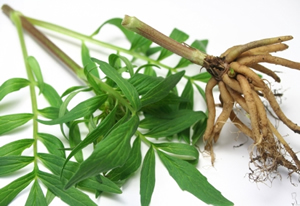“Valerian”
Botanical Name: Valeriana officinalis
Common name: Valerian
Family: Valerianaceae
Parts Used: Rhizome and root
Active Constituents:
- Iridoid glycosides called valepotriates (0.5-2%) – sedative-
- Alkaloids
- Volatile oil -sedative
- Valeric acid and derivatives – sedative
- Amino acids (including choline)
- Lignans
Qualities:
Bitter, pungent, cooling, drying & sweet
Person-Picture:
A ‘well controlled person’ – tightly controlled. Cool at all times. May have one word answers. “Mind over matter”. Won’t give much away. Passionate but may not show it.
These people may be afraid to sleep.
There is muscular contraction & tension. Fears that are held in — manifest as tension. Gritting teeth. May have fluctuating blood pressure & enlarged spleen.
Actions:
- Anxiolytic / GABAminergic
- Sedative
- Hypnotic
- Spasmolytic (smooth & skeletal)
- Anodyne / Analgesic
- Carminative
- Hypotensive / blood vessel relaxant
- Nervine
- Improves sleep latency (i.e. time taken until falling asleep) and sleep quality
“…for such as be troubled with the crampe and other convulsions, and for all those that are bruised with falles” – John Gerard, 1597
Indications:
NS:
- Conditions presenting nervous excitability (specific)
- Insomnia & disturbed sleep – it has been found that Valerian, either on its own or in combination with Hops, was associated with improvements in sleep latency and sleep quality. It appears to improve the quality of sleep, reduce the time it takes to get to sleep and not cause drowsiness upon awakening.
- Restlessness
- Nervous tension

- Anxiety / hysteria
- Stress
- Migraine / headache
- Epilepsy
- Pain reliever
– withdrawn from benzodiazepines
- Nervous digestive problems
- IBS
- Digestive and menstrual spasms
- Intestinal colic and flatulence
MSK:
- Rheumatic / joint / muscle pain
- Skeletal muscle tension
Cardiovascular:
- High blood pressure
- Nervous heart problems
Contraindications:
- Contraindicated in pregnancy and lactation and children under 12 years
- Kidney disorders (Bone)
Cautions:
- High doses may lead to morning drowsiness
- Some individuals experience a stimulating effect (10%?)
- Traditionally sedatives were avoided during depression and insomnia with restlessness during the early hours of the morning
Ody warns to not use more than 2-3 weeks without a break – continual use or high doses may lead to headaches & palpitations
Interactions:
CNS depressants or alcohol Additive effect with benzo’s
Dosage:
- Insomnia – hops, scullcap, passionflower, kava, California poppy
- Pain – Kava, salix, Jamaican dogwood
- Anxiety – hypericum, kava
POINTS OF NOTE:
- Valarian is probably best known as a soporific and prescribed to treat insomnia
- Approximately 1 in 10 people will find valerian to be stimulating rather than relaxing
- High doses may lead to a feeling of grogginess and a ‘hangover effect’ in the morning
- A specific for anxiety with depression
- May be combined with hypericum in anxiety and depression
- Is a spasmolytic used also for cramps and colic
References & Links to Articles:



